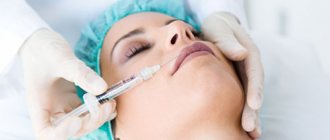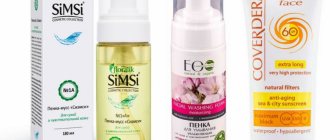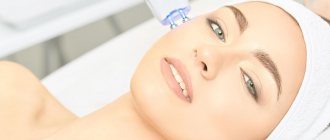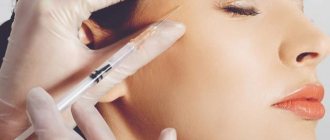Our largest organ, the “receptor field,” our skin is capable of amazing things. It protects us every day from environmental influences, carries out numerous operations and transmits changes that occur in our body.
We can talk forever about the fact that skin needs proper and daily care throughout life. We decided to focus on the more anxious and, at the same time, stressful period that befalls the skin during pregnancy.
Skin during pregnancy and what happens to it?
It's no secret that during pregnancy a woman undergoes colossal changes in all organs and systems of the body, including the largest of them - the skin.
The appearance of skin changes of different origins is physiologically determined and inevitable (recorded in 89-99% of pregnant women). They are associated with immunological, hormonal and metabolic changes in the body, and do not threaten the expectant mother or baby.
You also need to take into account the fact that most skin problems disappear after childbirth and require only symptomatic therapy. In addition, those women who are pregnant not for the first time have a greater risk of skin discomfort. For them, the “memory” of pregnancy may not disappear for a long time, or may remain for life.
Hormonal changes during pregnancy and their impact
It is difficult to imagine the “waltz” or “samba” of hormones that occurs throughout all trimesters of pregnancy to create a new life. And all their activities have a certain reflection on the skin.
Most physiological changes in the skin occur and are noticeable during the 2nd-3rd trimester. Estrogens (estradiol, estrone and estriol) are formed in the placenta from dehydroepiandrosterone, which is produced from the adrenal glands of the mother and fetus.
Regular changes also occur in other endocrine organs of a woman, such as the pituitary gland and thyroid gland. During the first months of pregnancy, there is an increase in its function, and then its decrease.
The pituitary gland produces an increased amount of gonadotropic hormones, alpha and beta melanocyte-stimulating hormones, which affect the process of melanogenesis. Accordingly, the expression of receptors for sex hormones in the skin, its appendages and the walls of blood vessels increases.
Estrogen receptors (alpha and beta) are expressed in keratinocytes, sebocytes, eccrine glands, blood vessels and dermal fibroblasts. Activation of estrogen receptors during pregnancy, in many cases, is the cause of physiological changes in hair growth and activation of the sebaceous glands.
It is a proven fact that dry and flaky skin in pregnant women is associated precisely with increased levels of estrogen production.
Does dry skin affect the fetus?
If dry skin during pregnancy is caused by a lack of fluid, an unbalanced diet, or changes in hormone levels, it does not have any effect on the health and development of the child (we recommend reading: the effect of allergies during pregnancy on the fetus). In this case, only the woman feels the unpleasant consequences. They are expressed in:
- dryness, flaking of the skin;
- itching;
- formation of stretch marks;
- the appearance of microcracks;
- dandruff formation.
Allergies to certain foods, cosmetics or medications are dangerous for the fetus. At the same time, rashes appear on the skin, it itches, and dries out. Sometimes the condition is passed on to the child. A disease that is complicated by dry skin can also harm the baby.
Pregnancy and skin - physiological changes and their consequences
All physiological changes in the skin during pregnancy can be divided into 4 types:
- pigmented (linea nigra, melasma, growth and appearance of pigmented nevi)
- Connective tissue related (soft fibroids, stretch marks/stretch marks)
- vascular (stellate angiomas, erythema of the palms, vasodilation, swelling, marbling of the skin)
- associated with skin appendages (increased sweating and sebum, hair loss, or vice versa - an increase in their thickness).
Pigmentation during pregnancy
Pigment spots, to one degree or another, are present in all pregnant women. This is especially true for expectant mothers who have dark skin color - pigmentation is more common in them, but in fair-skinned mothers it is more noticeable.
Increased production of melanocyte-stimulating hormone (MSH) by the pituitary gland + stimulation of melanocytes are the main reasons that provoke the appearance of age spots.
In addition, the placenta has a huge amount of bioactive sphingolipids, which can enhance melanogenesis. As a result, melanin accumulates in the epidermis, and in small quantities, in the middle of dermal macrophages (melanophages).
“Line nigra” of the abdomen during pregnancy - linea nigra
Linea nigra is the so-called “black line”, which forms in place of the white line of the abdomen and is more common than other types of pigmentation.
The linea alba has the appearance of a fibrous plate formed from the fibers of the aponeurosis of the abdominal muscles, is pigmented and takes on the appearance of a dark line.
Those parts of the body that had a darker shade before pregnancy (breast areola, face, neck, umbilical fossa) become dark. To this list, you can also add areas of skin that are in friction zones - the inner thighs, perineum, armpits and scars.
Melasma in pregnant women
Also known as the “mask of pregnancy”, which occurs in 25-75% of pregnant women. This type of pigmentation is brown in color, predominantly concentrated on the face and appears symmetrically with uneven but well-defined edges.
Melasma can occur on the outer part of the shoulders and forearms.
Histological studies of melasma show increased numbers of melanocytes and melanin in the epidermis and melanophages in the dermis.
In general, any changes that occur with pigment spots and cause you doubts are a reason to consult a dermatologist. The doctor will perform a biopsy of a suspicious area of skin under local anesthesia, which will in no way affect the health of the expectant mother or baby.
Protection during pregnancy
If your favorite form of relaxation is basking in the sun until you get a bronze tan, then during pregnancy you will have to limit yourself and replenish your cosmetic bag with high-quality sunscreens with a high level of SPF filters.
After all, pigmentation will only become more complex under the influence of sunlight and become more pronounced.
Sunscreen should be applied to exposed skin, even while at home (especially if your premises are on the sunny side of the building). Because direct sunlight is dangerous even when it penetrates through windows.
The sunscreens presented in the TOTIS catalog are not only safe during pregnancy, but are also recommended for use:
Innoaesthetics (Spain)
Sunblock UVP 50+ (the latest generation of sun filters + moisturizing and antioxidant effects).
Sunblock UVP 50+ Oily Skin (suitable for pregnant women with oily skin, has a mattifying effect + regulates sebum secretion).
Urban Day Cream SPF 20 (a day cream for the face that has powerful protection against free radicals, oxidation, pollution and solar radiation + moisturizes and leaves the skin firm and smooth).
Maternity powder + sun protection:
Coverage UVP 50+ Light / Medium (a compact foundation that contains a new combination of UV filters, emollients and moisturizing components)
Professional therapy for hyperpigmentation
Me Line 0.4 BB Cream Light / Medium is a professional sunscreen with SPF 30 + tinting effect (light and medium).
Mastelli (Italy)
Day Cream SPF 20 (daily sun protection + elasticity, firmness and radiance of the skin).
I would also like to add to the general recommendations that:
- The expectant mother should refrain from walking during the period of greatest solar activity (from 10:00 to 16:00).
- Try to create your own unique summer look using high-quality sunglasses, wide-brimmed hats and closed clothing made from natural fabrics.
Stretch marks in pregnant women
Stretch marks (striae) are skin defects that appear in the form of atrophic scars of varying widths. In other words, these are microtraumas of the skin that occur as a result of rapid tissue stretching.
It would be more correct to say that stretching on the body is the result of several factors: heredity, mechanical stretching and the activity of hormones. Typically, stretch marks in pregnant women appear on the abdomen, buttocks, thighs and chest.
Visually, stretch marks look like lines, the color of which varies from light brown to red-purple. Those that appeared not so long ago have a reddish-bluish tint, which becomes pale over time. The brightness of striae depends on whether they are located in places where a large number of vessels accumulate or not.
In expectant mothers, stretch marks on the abdomen and chest are located radially and can sometimes be convex. Sometimes the width of such scars reaches 5 mm, and the length - up to 10 cm.
Effective facial skin care in those areas where microtears appear most often will help counteract the appearance of stretch marks. In order to improve the condition of the skin and its elasticity, dermatologists advise taking a contrast shower, which can be completed by dousing it with cool water (but not cold!).
In addition, moisturizing and nourishing creams that stimulate the production of natural collagen will come to the rescue.
The assortment of the company Dr. Spiller has an effective remedy for expectant mothers - this is S-Care Cream . The cream strengthens the skin, maximally moisturizes, nourishes, and also initiates the production of its own elastin and collagen in the tissues. S-Care Cream can be applied even during the third trimester of pregnancy.
Prevention of stretch marks - preparing the skin for pregnancy
The best way to improve the condition of your skin after pregnancy is to take care of it in advance and prepare it for future stretching.
The Spanish company Innoaesthetics offers expectant mothers to take a biologically active drug - Age Control. The complex slows down the aging process, replenishes the lack of vital vitamins and elements during pregnancy.
What is the value of Age Control in preparing for pregnancy?
- The complex contains vitamin B9 (folic acid) , which is basic, both during planning and during the first trimester of pregnancy. Taking folic acid prevents the occurrence and development of neural tube defects in the embryo.
- Vitamin B12 + iron is a combination that is extremely important for preventing the occurrence of iron deficiency (anemia) in pregnant women.
- Coenzyme Q10, lycopene + a combination of vitamin E and selenium effectively help cope with oxidative stress and block the oxidation processes of free radicals.
Swelling during pregnancy and vascular changes
Hemangiomas, swelling, erythema of the palms (soles), marbling of the skin, an expressive venous network on the mammary glands, varicose veins, inflammation of the gums and granuloma - this is all a list of the consequences of vascular changes in the body of a pregnant woman.
The entire process of vascular transformation is associated with fibroblast growth factor (produced by the placenta), which takes an active part in angiogenesis, and increased levels of estrogen.
It is logical that during pregnancy, the volume of circulating blood (CBV) increases. In addition, the following changes are observed:
- capillary permeability;
- vasodilation;
- instability of vascular tone;
- inflammatory changes in the vascular wall.
Swelling of any parts of the body occurs due to increased permeability of the vascular walls, sodium and water retention in the body. Estrogens increase the production of their own hyaluronic acid, which binds water molecules to each other, which provokes excess hydration and swelling of tissues.
Cuperosis in pregnant women
Cuperosis is a condition that develops as a result of circulatory problems in the upper layers of the epidermis, and occurs in a third of pregnant women. The main cause of rosacea, as scientists say, is heredity.
Causes of rosacea in pregnant women
- Sudden changes in air temperature (harmfully affect the elasticity of capillary walls, making them too vulnerable and brittle).
- The scorching sun, frost and wind also negatively affect the condition of the vascular system.
- Changes in hormonal levels.
- Taking contraceptives and hormone therapy.
In most cases, this problem can be controlled with proper home care. An ideal candidate-assistant would be a complex of Anti Couperose Gel + Anti Couperose Cream preparations.
Together, these products restore the skin and counteract the occurrence of edema. The cream, in combination with the gel, strengthens the vascular wall and eliminates signs of skin irritation, giving a feeling of comfort.
If the aroma and texture of the above gel and cream do not satisfy the needs of a pregnant woman’s skin, Dr. Spiller’s assortment includes a universal Rescue product - Mystical Land (ampoule concentrate). It is enough to use it morning and evening to strengthen blood vessels and actively moisturize, thanks to the content of pure hyaluronic acid.
More information about rosacea and rosacea can be found in our article.
Dermatosis in pregnant women
During pregnancy, women can be diagnosed with 1 of 4 forms of dermatoses:
- pemphigoid or pregnancy herpes;
- polymorphic dermatosis of pregnant women (benign inflammation, which is accompanied by itching);
- intrahepatic cholestasis (characterized by acute itching at the onset of the disease, and begins on the palms and soles)
- Atopic dermatitis is the most common dermatosis in pregnant women (a benign disease characterized by an eczematous and papular rash).
Treatment of dermatoses is aimed at normalizing the level of bile acids in the blood serum, in order to reduce the risk for the baby and control symptoms in the mother. Treatment with ursodeoxycholic acid (UDCA) is recommended. It is also possible to use dexamethasone as an antihistamine.
In general, treatment of dermatoses in pregnant women is considered simple, especially during the first trimester of pregnancy. After the appearance of symptoms of dermatosis in pregnant women, joint consultation and treatment of the patient with an obstetrician-gynecologist and a dermatologist is necessary.
How to moisturize the skin of the abdomen during pregnancy?
If your abdominal skin becomes dry and itchy, apply moisturizers and emollients more often.
If this or that clothing causes you discomfort (for example, the waistband of trousers, tights rubs, or synthetics irritate your skin), do not wear it at all. To counteract dry skin, drink more fluids and humidify the air in the rooms where you spend a lot of time in winter. If it is not possible to install a humidifier, simply spray plain water in the air. By the way, you can use thermal water in an aerosol can: it is usually sprayed on the face, but it will also perfectly moisturize the skin of the abdomen.
Skin care during pregnancy
Our skin is like a sponge - it absorbs everything it comes into contact with. This well-known fact is of great importance for expectant mothers. Since some components included in certain cosmetic products that are on a pregnant woman’s shelf can harm both mother and baby.
The components of cosmetic products tend to be quickly absorbed into the blood. This physiological nuance is very important when choosing skin care products.
The uteroplacental connection between mother and baby begins to form as early as the 16th week of pregnancy (their blood circulation mixes). Of course, the placenta provides reliable protection for the fetus, but cannot guarantee it 100%.
Cosmetics for pregnant women: what is safe and what is not?
Pregnant women should be careful when using cosmetics that they used regularly before becoming pregnant. Normal skin can suddenly become problematic with rashes and increased levels of sebum secretion, or dry, oily.
Safe cosmetics for pregnant women
Let's talk about the basic rules that need to be followed when choosing cosmetics.
Cosmetics for pregnant women - how to choose?
- Facial products should have a mild effect and not contain various aggressive factors, such as AHA acids.
- Do not buy cosmetics in pharmacies, they should not be medicinal. This is especially true for products with retinol.
- Choose only those brands that have proven themselves to be proven and safe for pregnant women.
- Give preference to cosmetics without fragrances, as they can cause allergies.
Cosmetics and pregnancy - what to avoid in products?
If before pregnancy you might have neglected to check the composition of both decorative and everyday cosmetics, then during pregnancy you should be vigilant and read what the manufacturers of even the safest “organic” write.
The list of prohibited ingredients includes essential oils of the following plants:
- cedar
- fennel
- parsley
- thyme
- mint
- oregano
- sage
The listed plants and their extracts in cosmetic products can provoke a miscarriage or cause anaphylactic shock in the expectant mother.
Also, during pregnancy you should definitely avoid products that contain retinol, hydroquinone, triclosan - which can harm the woman’s reproductive system. Products containing salicylic acid, formaldehyde and parabens are prohibited.
Cosmetics Dr. Spiller - safe care during pregnancy
Of course, not the entire range of Dr. cosmetics. Spiller will satisfy the needs of a pregnant woman's body. But the natural potential of the production base and certified product safety are included in separate lines that can be used during pregnancy.
This is the Sensicura . It is designed not only to care for capricious skin, but also for those that have changed due to hormonal changes.
None of the cosmetics contain silicones, perfumed oils or preservatives. Every mother can find a cream, tonic or emulsion according to her face and body skin type.
Safe cosmetics for pregnant women from Dr. Spiller
Sensicura Cleansing Emulsion is a delicate emulsion that is equally suitable for owners of oily and dry skin types. The only difference will be in the method of applying and rinsing off the product.
Sensicura Tonic, also universal for all skin types. Despite the lipid content in the tonic, even oily skin will not become heavier, and the pregnancy period will pass without the feeling of “something extra” on the face.
Sensicura Eye Cream, Sensicura Cream Mask and Sensicura Serum also belong to gentle and delicate home skin care.










